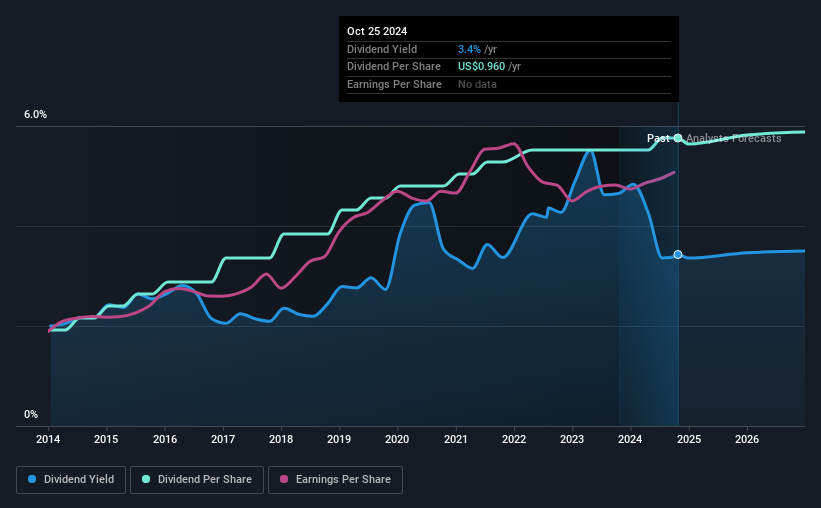- United States
- /
- Banks
- /
- NasdaqGS:BSRR
Is It Smart To Buy Sierra Bancorp (NASDAQ:BSRR) Before It Goes Ex-Dividend?

Sierra Bancorp (NASDAQ:BSRR) is about to trade ex-dividend in the next 4 days. The ex-dividend date is usually set to be one business day before the record date which is the cut-off date on which you must be present on the company's books as a shareholder in order to receive the dividend. The ex-dividend date is an important date to be aware of as any purchase of the stock made on or after this date might mean a late settlement that doesn't show on the record date. Therefore, if you purchase Sierra Bancorp's shares on or after the 31st of October, you won't be eligible to receive the dividend, when it is paid on the 12th of November.
The company's next dividend payment will be US$0.24 per share, on the back of last year when the company paid a total of US$0.96 to shareholders. Based on the last year's worth of payments, Sierra Bancorp stock has a trailing yield of around 3.4% on the current share price of US$27.99. Dividends are an important source of income to many shareholders, but the health of the business is crucial to maintaining those dividends. So we need to investigate whether Sierra Bancorp can afford its dividend, and if the dividend could grow.
View our latest analysis for Sierra Bancorp
Dividends are typically paid from company earnings. If a company pays more in dividends than it earned in profit, then the dividend could be unsustainable. Sierra Bancorp paid out a comfortable 37% of its profit last year.
Companies that pay out less in dividends than they earn in profits generally have more sustainable dividends. The lower the payout ratio, the more wiggle room the business has before it could be forced to cut the dividend.
Click here to see the company's payout ratio, plus analyst estimates of its future dividends.

Have Earnings And Dividends Been Growing?
Companies with consistently growing earnings per share generally make the best dividend stocks, as they usually find it easier to grow dividends per share. Investors love dividends, so if earnings fall and the dividend is reduced, expect a stock to be sold off heavily at the same time. With that in mind, we're encouraged by the steady growth at Sierra Bancorp, with earnings per share up 5.8% on average over the last five years.
Another key way to measure a company's dividend prospects is by measuring its historical rate of dividend growth. Sierra Bancorp has delivered 12% dividend growth per year on average over the past 10 years. We're glad to see dividends rising alongside earnings over a number of years, which may be a sign the company intends to share the growth with shareholders.
To Sum It Up
Has Sierra Bancorp got what it takes to maintain its dividend payments? Sierra Bancorp has seen its earnings per share grow slowly in recent years, and the company reinvests more than half of its profits in the business, which generally bodes well for its future prospects. In summary, Sierra Bancorp appears to have some promise as a dividend stock, and we'd suggest taking a closer look at it.
On that note, you'll want to research what risks Sierra Bancorp is facing. In terms of investment risks, we've identified 1 warning sign with Sierra Bancorp and understanding them should be part of your investment process.
If you're in the market for strong dividend payers, we recommend checking our selection of top dividend stocks.
New: Manage All Your Stock Portfolios in One Place
We've created the ultimate portfolio companion for stock investors, and it's free.
• Connect an unlimited number of Portfolios and see your total in one currency
• Be alerted to new Warning Signs or Risks via email or mobile
• Track the Fair Value of your stocks
Have feedback on this article? Concerned about the content? Get in touch with us directly. Alternatively, email editorial-team (at) simplywallst.com.
This article by Simply Wall St is general in nature. We provide commentary based on historical data and analyst forecasts only using an unbiased methodology and our articles are not intended to be financial advice. It does not constitute a recommendation to buy or sell any stock, and does not take account of your objectives, or your financial situation. We aim to bring you long-term focused analysis driven by fundamental data. Note that our analysis may not factor in the latest price-sensitive company announcements or qualitative material. Simply Wall St has no position in any stocks mentioned.
About NasdaqGS:BSRR
Sierra Bancorp
Operates as the bank holding company for Bank of the Sierra that provides retail and commercial banking services to individuals and businesses in California.
Flawless balance sheet, undervalued and pays a dividend.

